9 Foods High In Potassium You Should Add To Your Diet 2024
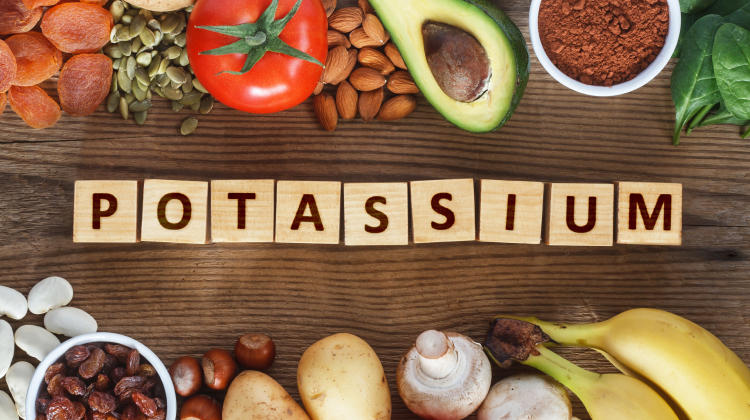
Potassium is an essential mineral that provides important health benefits to our bodies. Potassium reduces the risk of hypertension, cardiovascular disease, or diabetes. However, for some other conditions such as chronic kidney disease, potassium intake should be limited.
Here we list potassium-rich foods for those who want to protect their heart and support healthy blood sugar levels. We’ve also included guidance for those who need to limit potassium in their diet due to kidney disease.
Foods That Are High In Potassium
- Potatoes
- Bananas
- Avocados
- Tomatoes and tomato juice
- Green vegetables
- Nuts
- Dairy products
- Legumes
- Meat products
9 High Potassium Foods To Eat
Potassium-rich foods are very nutritious as they contain vital minerals, vitamins, and other nutrients. Choosing foods high in potassium provides many benefits, as high-potassium foods tend to be nutritious as a whole.
Potatoes

Potatoes, depending on their types, are the foods highest in potassium. One medium baked potato includes 610 mg[1] of potassium. One medium-cooked sweet potato contains 542 mg[2] of potassium. One medium-baked white potato contains the highest amount of potassium among potatoes, which is 941 mg[3] of potassium.
White potatoes contain a higher amount of potassium than sweet potatoes. You can get one-third to one-half of the daily recommended potassium intake with one or two potatoes, depending on the type.
Bananas

Bananas are one of the top foods many think of when they think of potassium. A medium banana includes 422 mg[4] of potassium. Bananas[5] also contain many different bioactive compounds, natural antioxidants, and dietary fiber, which are also involved in cardiovascular and metabolic health.
Avocados

Although not as widely known, avocados are one of the highest potassium sources among all foods. One avocado has nearly 1000 mg[6] of potassium. However, one serving of avocado is only half of the avocado due to its high-fat content.
This is why recent studies are focused on avocados’ blood pressure-lowering effects. The examinations held with a great number of populations showed that eating avocados lowers high blood pressure[7], reduces oxidative stress[8], and regulates blood cholesterol[9].
Tomatoes And Tomato Juice
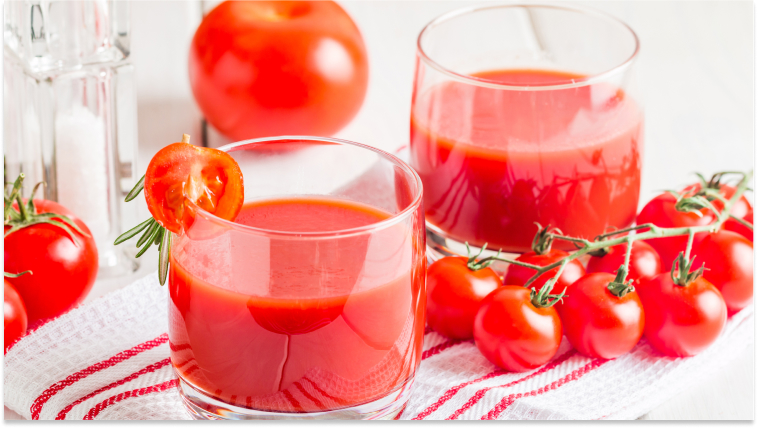
Besides being high in potassium, tomatoes are also a good source of lycopene. With these two nutrients combined,, tomatoes are considered a good option for maintaining cardiovascular and metabolic health[10].
One medium tomato provides 292 mg[11] of potassium. In tomato juice or tomato sauces, the potassium amount increases since these products contain a concentrated dose of tomatoes. For example, a cup of tomato juice (240 ml) contains 527 mg[12] of potassium.
One cup of tomato sauce has 728 mg[13] of potassium. However, most of us probably wouldn’t consume that much sauce in one sitting.
Green Vegetables
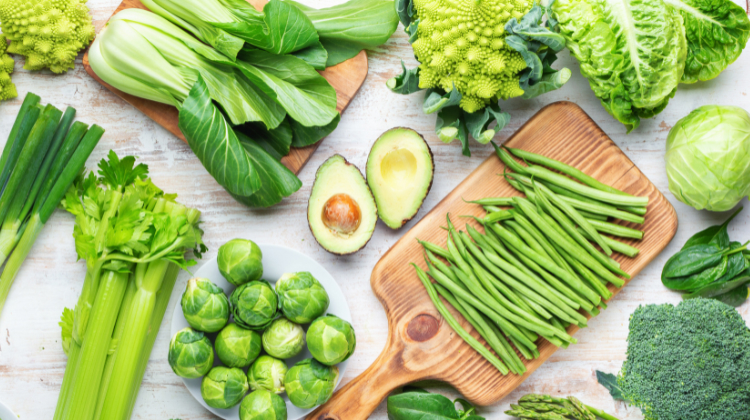
Green veggies are also rich in potassium, and eating more of these is one of the reasons a plant-based diet is beneficial for cardiovascular[14] and cardio-metabolic[15] diseases.
For 100 g (10 leaves) of raw spinach, there is 554 mg[16] of potassium. The same amount of cooked spinach has less potassium, but still a good amount, at 466 mg[17]. One cup of parsley has 332 mg[18] of potassium, and one cup of cooked broccoli contains 458 mg[19] of potassium.
Nuts

A comprehensive review and meta-analysis showed that nuts are beneficial for lowering hypertension[20]. Nuts are also an important component of the Mediterranean diet[21], a diet seen to be beneficial for health. For a one-ounce serving of cashews (29 g) of cashews, there is 187 mg[22] of potassium. The same amount of almonds has 208 mg[23] of potassium.
Dairy Products
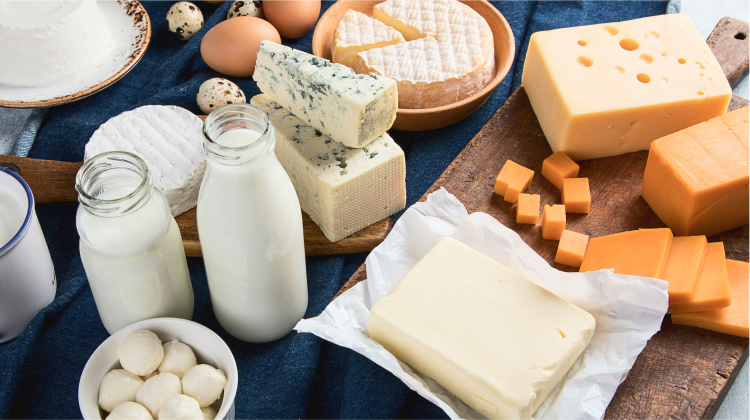
One cup of yogurt and whole milk contains 300[24]–350 mg[25] of potassium. Dairy products are also a good source of dietary protein and have many cardio-metabolic benefits[26].
For example, eating dairy can support a healthy blood sugar level and metabolism. Dairy also provides other essential minerals in addition to potassium such as calcium and phosphorous to maintain bone health[27].
Legumes
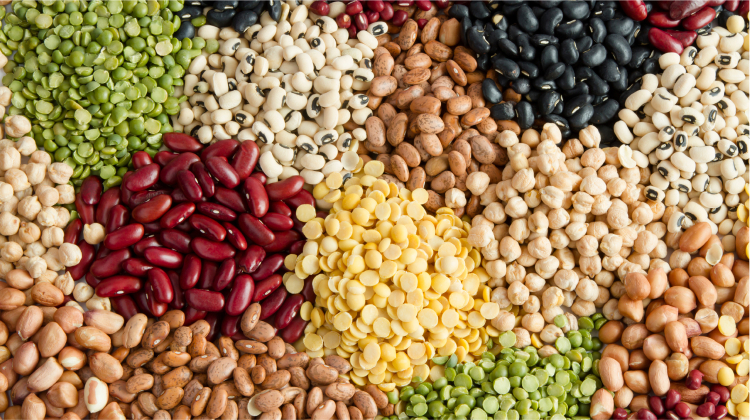
Legumes are a quality plant-based protein and help prevent[28] coronary heart disease, hypertension, and diabetes. One cup of beans contains 906 mg[29] of potassium, and lentils contain 731 mg[30] of potassium.
Meat Products
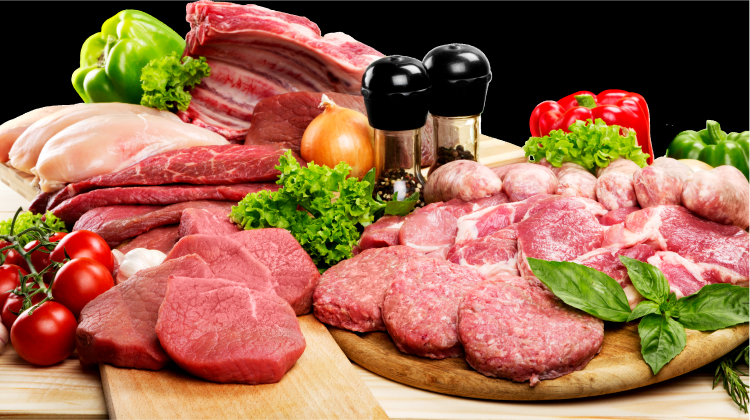
Potassium is not just found in plant products, it’s also present in both red and white meat. One cup of chopped and cooked chicken meat includes 232 mg[31] of potassium, and a beef steak contains 497 mg[32] of potassium.
Why Do You Need Potassium?
Potassium is an essential mineral and electrolyte that helps with many of our body’s functions. A vital function of potassium is keeping the intracellular and extracellular fluid levels balanced[33]. In this role, they work together with sodium.
Specifically, potassium is involved in regulating our heart rate, blood pressure, and supporting our overall heart health. It also helps our muscles to contract.
We need to consume potassium in our diet because we lose some of it[34] through urine and stool. But, you may be wondering how much potassium is enough.
According to the National Academies of Sciences, Engineering, and Medicine[35], daily potassium intake should be 2600 mg for women and 3500 mg for men. Also, on the National Institute of Health[36] website, potassium health benefits and recommendations were reviewed in detail. Here is the daily potassium recommendation for each gender and age group.
| Age | Male | Female | Pregnancy | Lactation |
| Birth to 6 months | 400 mg | 400 mg | ||
| 7–12 months | 860 mg | 860 mg | ||
| 1–3 years | 2,000 mg | 2,000 mg | ||
| 4–8 years | 2,300 mg | 2,300 mg | ||
| 9–13 years | 2,500 mg | 2,300 mg | ||
| 14–18 years | 3,000 mg | 2,300 mg | 2,600 mg | 2,500 mg |
| 19–50 years | 3,400 mg | 2,600 mg | 2,900 mg | 2,800 mg |
| 51+ years | 3,400 mg | 2,600 mg |
Figure 1[37]: Daily value of potassium needs according to age and gender.
Potassium & Hypertension
Potassium helps to maintain normal blood pressure. The vessels should dilate against high blood pressure to avoid vascular damage, and potassium has a role in this function.
Also, one of the primary causes of high blood pressure is blood vessel constriction and an overactive nervous system. Potassium helps dilate and relax the blood vessels and suppresses this overactive alertness of the body.
According to the Centers for Disease Control and Prevention (CDC)[38], low dietary potassium levels and high sodium intake increase blood pressure.
This is also why potassium is essential for a healthy pregnancy, which can support healthy blood pressure throughout pregnancy.
Potassium & Blood Sugar
We need enough potassium for insulin secretion and blood sugar regulation[39]. Unfortunately, the western diet is high in sodium and lower in potassium, a risk factor for chronic diseases such as diabetes.
Pregnant women are at risk of developing gestational diabetes related to increased blood sugar from pregnancy hormones. You can see the increased need for potassium in the pregnancy or lactation period of women in Figure 1.
Potassium And Kidney Disease
While potassium is an essential nutrient for human health, there are some health problems that require a decrease in potassium intake.
When the loss of kidney function occurs, the regulation of the substances taken with food becomes difficult. Kidneys can’t regulate levels of phosphorus, potassium, and sodium as efficiently, and these can build up in the blood if you’re taking in too much.
Because of this, you may need to limit your dietary intake[40] of these electrolytes if you have kidney disease.
In patients with chronic kidney disease[41], taking too much potassium can cause an increase in the amount of potassium in the blood due to kidney dysfunction in the body, which leads to arrhythmias in the heart. This condition is called hyperkalemia.
On the other hand, potassium is beneficial for general kidney health. Potassium can be effective against the formation of kidney stones[42]. For this reason, it is stated in studies that you can prefer fruit juices with high potassium-citrate content to prevent kidney stone formation.
How To Consume Potassium In A Diet?
You can get enough potassium from a daily diet. When there is an excessive need for potassium, it is easy to consume fruit and vegetable juices such as carrot juice, orange juice, prune juice, and pomegranate juice.
Dietary potassium intake can be increased with dried fruits or nuts or by adding avocado and potato to meals as a side dish or topping. Also, bananas may help increase your potassium intake when consumed with oat bowls, granola, or milkshakes.
You can prepare potassium-rich milkshakes using bananas, almonds, some spinach, and milk. Also, it is easy to prepare leafy greens juices to get a significant amount of potassium in one serving.
Some dietary supplements and products help to provide potassium needs if you can not consume enough vegetables and fruits daily.
Even though it is a very healthy nutrient, excessive potassium can harm our bodies.
How To Reduce Potassium Intake In Case Of Need?
Several food preparation methods might be beneficial to reduce dietary potassium in your food. Researchers indicate[43] that cooking in water, using a microwave, or cooking with pressure are good culinary techniques for lowering the potassium content of the food.
The Bottom Line
A diet rich in potassium is crucial in preventing cardiovascular diseases. As the number of health-conscious people increases, prioritizing potassium will contribute to preventive approaches related to hypertension and heart problems.
Especially in kidney diseases, potassium levels are routinely monitored.
You may need to adjust your dietary potassium sources according to your health status, conditions, or disease risks. Always speak to your medical doctor or registered dietitian for individualized nutrition recommendations.
+ 43 sources
Health Canal avoids using tertiary references. We have strict sourcing guidelines and rely on peer-reviewed studies, academic researches from medical associations and institutions. To ensure the accuracy of articles in Health Canal, you can read more about the editorial process here
- Usda.gov. (2022). FoodData Central. [online] Available at: https://fdc.nal.usda.gov/fdc-app.html#/food-details/170033/nutrients
- Usda.gov. (2022). FoodData Central. [online] Available at: https://fdc.nal.usda.gov/fdc-app.html#/?query=potato
- Usda.gov. (2022). FoodData Central. [online] Available at: https://fdc.nal.usda.gov/fdc-app.html#/food-details/170434/nutrients
- Usda.gov. (2022). FoodData Central. [online] Available at: https://fdc.nal.usda.gov/fdc-app.html#/food-details/173944/nutrients
- Singh, B., Singh, J.P., Kaur, A. and Singh, N. (2016). Bioactive compounds in banana and their associated health benefits – A review. Food Chemistry, [online] 206, pp.1–11. doi:10.1016/j.foodchem.2016.03.033.
- Usda.gov. (2022). FoodData Central. [online] Available at: https://fdc.nal.usda.gov/fdc-app.html#/food-details/171705/nutrients
- Monge, A., Stern, D., Cortés-Valencia, A., Catzín-Kuhlmann, A., Lajous, M. and Denova-Gutiérrez, E. (2022). Avocado consumption is associated with a reduction in hypertension incidence in Mexican women. British Journal of Nutrition, [online] pp.1–8. doi:10.1017/s0007114522002690.
- Singh, P.K., Gari, M., Choudhury, S., Shukla, A., Gangwar, N. and Garg, S.K. (2019). Oleic Acid Prevents Isoprenaline-Induced Cardiac Injury: Effects on Cellular Oxidative Stress, Inflammation and Histopathological Alterations. Cardiovascular Toxicology, [online] 20(1), pp.28–48. doi:10.1007/s12012-019-09531-y.
- Mahmassani, H.A., Avendano, E.E., Raman, G. and Johnson, E.J. (2018). Avocado consumption and risk factors for heart disease: a systematic review and meta-analysis. The American Journal of Clinical Nutrition, [online] 107(4), pp.523–536. doi:10.1093/ajcn/nqx078.
- Friedman, M. (2013). Anticarcinogenic, Cardioprotective, and Other Health Benefits of Tomato Compounds Lycopene, α-Tomatine, and Tomatidine in Pure Form and in Fresh and Processed Tomatoes. Journal of Agricultural and Food Chemistry, 61(40), pp.9534–9550. doi:10.1021/jf402654e.
- Usda.gov. (2022). FoodData Central. [online] Available at: https://fdc.nal.usda.gov/fdc-app.html#/food-details/170457/nutrients
- Usda.gov. (2022). FoodData Central. [online] Available at: https://fdc.nal.usda.gov/fdc-app.html#/food-details/170545/nutrients
- Usda.gov. (2022). FoodData Central. [online] Available at: https://fdc.nal.usda.gov/fdc-app.html#/food-details/169074/nutrients
- Satija, A. and Hu, F.B. (2018). Plant-based diets and cardiovascular health. Trends in Cardiovascular Medicine, [online] 28(7), pp.437–441. doi:10.1016/j.tcm.2018.02.004.
- Kahleova, H., Levin, S. and Barnard, N. (2017). Cardio-Metabolic Benefits of Plant-Based Diets. Nutrients, [online] 9(8), p.848. doi:10.3390/nu9080848.
- Usda.gov. (2022). FoodData Central. [online] Available at: https://fdc.nal.usda.gov/fdc-app.html#/food-details/168462/nutrients
- Usda.gov. (2022). FoodData Central. [online] Available at: https://fdc.nal.usda.gov/fdc-app.html#/food-details/168463/nutrients
- Usda.gov. (2022). FoodData Central. [online] Available at: https://fdc.nal.usda.gov/fdc-app.html#/food-details/170416/nutrients
- Usda.gov. (2022). FoodData Central. [online] Available at: https://fdc.nal.usda.gov/fdc-app.html#/food-details/169967/nutrients
- Mohammadifard, N., Salehi-Abargouei, A., Salas-Salvadó, J., Guasch-Ferré, M., Humphries, K. and Sarrafzadegan, N. (2015). The effect of tree nut, peanut, and soy nut consumption on blood pressure: a systematic review and meta-analysis of randomized controlled clinical trials. The American Journal of Clinical Nutrition, [online] 101(5), pp.966–982. doi:10.3945/ajcn.114.091595.
- Ventriglio, A., Sancassiani, F., Contu, M.P., Latorre, M., Di Slavatore, M., Fornaro, M. and Bhugra, D. (2020). Mediterranean Diet and its Benefits on Health and Mental Health: A Literature Review. Clinical Practice & Epidemiology in Mental Health, [online] 16(1), pp.156–164. doi:10.2174/1745017902016010156.
- Usda.gov. (2022). FoodData Central. [online] Available at: https://fdc.nal.usda.gov/fdc-app.html#/food-details/170162/nutrients
- Usda.gov. (2022). FoodData Central. [online] Available at: https://fdc.nal.usda.gov/fdc-app.html#/food-details/170567/nutrients
- Usda.gov. (2022). FoodData Central. [online] Available at: https://fdc.nal.usda.gov/fdc-app.html#/food-details/171304/nutrients
- Usda.gov. (2022). FoodData Central. [online] Available at: https://fdc.nal.usda.gov/fdc-app.html#/food-details/172217/nutrients
- Hirahatake, K.M., Bruno, R.S., Bolling, B.W., Blesso, C., Alexander, L.M. and Adams, S.H. (2019). Dairy Foods and Dairy Fats: New Perspectives on Pathways Implicated in Cardiometabolic Health. Advances in Nutrition. [online] doi:10.1093/advances/nmz105.
- Rizzoli, R. (2021). Dairy products and bone health. Aging Clinical and Experimental Research, [online] 34(1), pp.9–24. doi:10.1007/s40520-021-01970-4.
- Journal of Medicinal Food. (2021). Nutritional Quality of Legumes, and Their Role in Cardiometabolic Risk Prevention: A Review | Journal of Medicinal Food. [online] Available at: https://www.liebertpub.com/doi/10.1089/jmf.2011.0238?url_ver=Z39.88-2003&rfr_id=ori%3Arid%3Acrossref.org&rfr_dat=cr_pub++0pubmed
- Usda.gov. (2022). FoodData Central. [online] Available at: https://fdc.nal.usda.gov/fdc-app.html#/food-details/173731/nutrients
- Usda.gov. (2022). FoodData Central. [online] Available at: https://fdc.nal.usda.gov/fdc-app.html#/food-details/172421/nutrients
- Usda.gov. (2022). FoodData Central. [online] Available at: https://fdc.nal.usda.gov/fdc-app.html#/food-details/172397/nutrients
- Usda.gov. (2022). FoodData Central. [online] Available at: https://fdc.nal.usda.gov/fdc-app.html#/food-details/173379/nutrients
- The Nutrition Source. (2019). Potassium. [online] Available at: https://www.hsph.harvard.edu/nutritionsource/.
- Stone, M., Martyn, L. and Weaver, C. (2016). Potassium Intake, Bioavailability, Hypertension, and Glucose Control. Nutrients, [online] 8(7), p.444. doi:10.3390/nu8070444.
- Stallings, V.A., Harrison, M. and Oria, M. eds., (2019). Dietary Reference Intakes for Sodium and Potassium. [online] Washington, D.C.: National Academies Press. doi:10.17226/25353.
- Nih.gov. (2019). Office of Dietary Supplements – Potassium. [online] Available at: https://ods.od.nih.gov/factsheets/Potassium-HealthProfessional/
- Nih.gov. (2019). Office of Dietary Supplements – Potassium. [online] Available at: https://ods.od.nih.gov/factsheets/Potassium-HealthProfessional/
- CDC (2022). Sodium, Potassium and Health. [online] Centers for Disease Control and Prevention. Available at: https://www.cdc.gov/salt/potassium.htm
- Ekmekcioglu, C., Elmadfa, I., Meyer, A.L. and Moeslinger, T. (2015). The role of dietary potassium in hypertension and diabetes. Journal of Physiology and Biochemistry, [online] 72(1), pp.93–106. doi:10.1007/s13105-015-0449-1.
- Kim, S.M. and Jung, J.Y. (2020). Nutritional management in patients with chronic kidney disease. The Korean Journal of Internal Medicine, [online] 35(6), pp.1279–1290. doi:10.3904/kjim.2020.408.
- Carrero, J.J., González-Ortiz, A., Avesani, C.M., Bakker, S.J.L., Bellizzi, V., Chauveau, P., Clase, C.M., Cupisti, A., Espinosa-Cuevas, A., Molina, P., Moreau, K., Piccoli, G.B., Post, A., Sezer, S. and Fouque, D. (2020). Plant-based diets to manage the risks and complications of chronic kidney disease. Nature Reviews Nephrology, [online] 16(9), pp.525–542. doi:10.1038/s41581-020-0297-2.
- Gul, Z. and Monga, M. (2014). Medical and Dietary Therapy for Kidney Stone Prevention. Korean Journal of Urology, [online] 55(12), p.775. doi:10.4111/kju.2014.55.12.775.
- Batista, R.A.B., Japur, C.C., Prestes, I.V., Fortunato Silva, J., Cavanha, M. and Pena, G. (2021). Potassium reduction in food by preparation technique for the dietetic management of patients with chronic kidney disease: a review. Journal of Human Nutrition and Dietetics, [online] 34(4), pp.736–746. doi:10.1111/jhn.12846.



